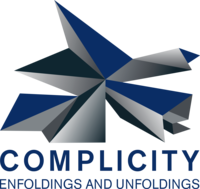Talk "Complicity: A Crisis of Participation in Testimonies of Totalitarianism in Contemporary German-language Literatures"
at the conference Complicity: Enfoldings and Unfoldings
Technical University Dresden, 7 April 2022
by Juliane Prade-Weiss

image courtesy of Cornelia Wächter
conference website
https://www.complicity-enfoldings-and-unfoldings.com/
abstract
Complicity is a subject of fascination in popular fiction and, at the same time, an eminent challenge to the democratic maxim of participation and in the role of the individual as responsible actor in political, economic, and ethical communities. Complicity is conventionally used as a legal term to describe the way a crime is committed, namely by aiding or abiding wrongdoing. A broader notion of complicity as being involved in complex structures has become a common feature in critical and public discourse, mostly in the claim that remaining inactive or continuing a certain habit renders the subject complicit in wrongdoings of humanitarian, political, ecological, moral, or other natures.
While pervasive structures of complicity without explicit consent indeed pose the question of what participation and individual responsibility means in a world of globalized markets, conflicts, climate change, and electronic media, the criticism of complicity raises the same question: Is there a point of view that is not involved in any social contexts? How would such a position communicate, given that languages rely on the participation in pre-determined structures of grammar, semantics, etc.? In how far is the assumption that the positions of analysis, critique, and opposition can be untouched of all wrongdoing itself an instance of complicity by ignoring the complexity of involvements?
Objective of the inquiry is a deeper insight into how complicity enfolds: First, by reading literary texts as genuine contributions to a general understanding of complicity that expound the comprehensive role of language in structures of participation and involvement. In portraying conflict and wrongdoing, literature relies on the complicity of the audience, be it the imagination of the reader, or the gaze of the spectator. Second, by employing insights of legal and social sciences research to highlight complicity as a pressing concern in contemporary German-language literary testimonies of totalitarianism that have, so far, been interpreted mostly with regard to memory culture, trauma, and (transnational) identity discourses. The concern of these texts, however, is just as much for the present as they outline modes of partaking in institutional violence that draws on heritage, culture, gender, social, and other distinctions. The modes of complicity stand out more clearly – and are acknowledged more readily – in dictatorships of the past. They are more complicated, but just as active, in the globalized world of the present.

